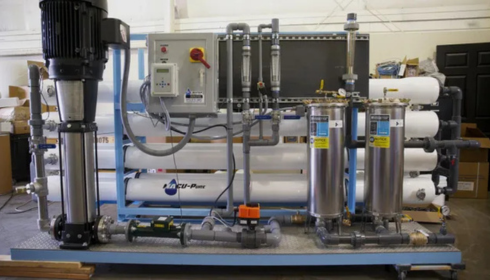Walk into any café, hotel, brewery, or even a busy office today, and there’s one thing quietly shaping the customer experience—water. It’s the most overlooked yet essential element in business operations. Whether it’s the taste of a cup of coffee, the lifespan of industrial equipment, or the safety of a restaurant’s ice machine, clean water isn’t optional. It’s foundational.
Businesses used to see water as just another utility—turn the tap, pay the bill, move on. But things have changed. Rising concerns about contaminants, stricter regulations, and a greater demand for sustainability have pushed companies to look more seriously at their water treatment solutions. What was once a backroom afterthought is now front and center in conversations about quality, safety, and efficiency.
The Growing Case for Commercial Water Solutions
Here’s the reality: untreated or poorly managed water creates headaches. Scaling in pipes, breakdowns in boilers, mineral deposits on expensive equipment, and even off-flavors in food and drinks—these issues eat into profit margins. Add in growing awareness around microplastics, heavy metals, and chemical residues, and businesses can’t afford to leave water quality to chance.
That’s why we’re seeing a shift toward advanced technologies like commercial reverse osmosis water treatment. Unlike basic filtration that catches only larger particles, reverse osmosis digs deeper. It forces water through a semi-permeable membrane, stripping away contaminants that most filters simply can’t touch. For restaurants, that means clearer ice and better-tasting beverages. For manufacturers, it means fewer equipment failures and lower maintenance costs. It’s the kind of upgrade that pays for itself over time.
Why Businesses Are Choosing Specialized Partners
Buying a water filter off the shelf may work at home, but businesses need more. They need a partner who understands water chemistry, local regulations, and industry-specific demands. Think about a brewery in Denver versus a hotel in Houston—the water challenges are entirely different.
This is where tailored solutions step in. Companies like Pure Water Source commercial treatment have carved out a niche by providing systems that aren’t just one-size-fits-all. They analyze the source water, the equipment it interacts with, and the long-term business goals before designing a system. It’s not about selling the biggest filter; it’s about engineering reliability and consistency. Businesses appreciate that. No one wants to troubleshoot why the espresso tastes different from one week to the next or explain to guests why the pool water looks cloudy.
Installation: More Than Just Plug and Play
Here’s something that doesn’t always get talked about enough—installation. It’s tempting to think you can buy a unit, connect a few pipes, and call it a day. But in reality, a sloppy setup can ruin even the best system.
That’s why professional commercial water treatment system installation is so valuable. Technicians ensure flow rates match the demand, pressure is optimized, and the system integrates seamlessly into existing infrastructure. They also anticipate future growth. A small café may double its water use within two years as it expands, so it makes sense to size the system accordingly. Proper installation isn’t glamorous, but it’s the backbone of performance and longevity. It’s like laying a solid foundation before building a house—cut corners there, and you’ll pay for it later.
Real-World Payoffs
So, what’s in it for the business owner who invests in a modern water treatment system? Plenty.
- Cost savings: Fewer breakdowns mean less downtime and lower repair bills.
- Better customer experience: Drinks taste better, linens feel softer, and showers are more pleasant.
- Sustainability: Many advanced systems reduce the need for bottled water or harsh chemical cleaners.
- Regulatory compliance: Staying ahead of local water quality standards avoids fines and legal trouble.
A restaurant owner once said, “I thought it was about taste, but really, it was about everything.” That sums it up. Cleaner water improves the experience across the board—from the kitchen to the bathroom sinks.
The Human Side of Water Decisions
It’s easy to get lost in the tech jargon—membranes, ion exchange, ultraviolet disinfection—but at its core, this conversation is about people. The family checking into a hotel wants to trust that the water is safe for their kids. The coffee shop regular expects the latte to taste the same every morning. The staff in a factory deserves clean water in their breakroom just as much as they deserve safe conditions on the floor.
When businesses invest in better water treatment, they’re investing in trust. Customers may never see the gleaming pipes or the polished stainless-steel tanks, but they feel the difference in subtle, everyday ways. And that’s what keeps them coming back.
Looking Ahead: Where Water Treatment Is Going
As sustainability becomes less of a buzzword and more of a demand, we’ll likely see more hybrid systems—solutions that recycle and repurpose water on-site, cutting down waste. Imagine a hotel that captures greywater from laundry, treats it, and reuses it in landscaping. Or a brewery that reclaims process water to clean equipment instead of sending it straight to the drain.
Smart technology will also play a role. Remote monitoring, automatic alerts, and data-driven adjustments are already making their way into treatment systems. It won’t be long before managers can track water purity on their phone alongside inventory levels and payroll apps.
Final Thoughts
Water isn’t just water when you’re running a business. It’s flavor, reputation, efficiency, safety, and even sustainability wrapped up in something that flows through every pipe and faucet. Ignoring it is like ignoring the wiring in a building—you might not notice until something goes wrong, and by then, it’s too late.
The businesses that thrive tomorrow are the ones paying attention today. They’re asking tough questions about their water sources, investing in smart solutions, and working with partners who understand that every drop counts. Whether it’s a café looking for consistency in their brews or a hotel safeguarding guest trust, clean water is more than a utility—it’s a promise.
And in a world where customers notice the little things, that promise might just be the biggest advantage of all.

